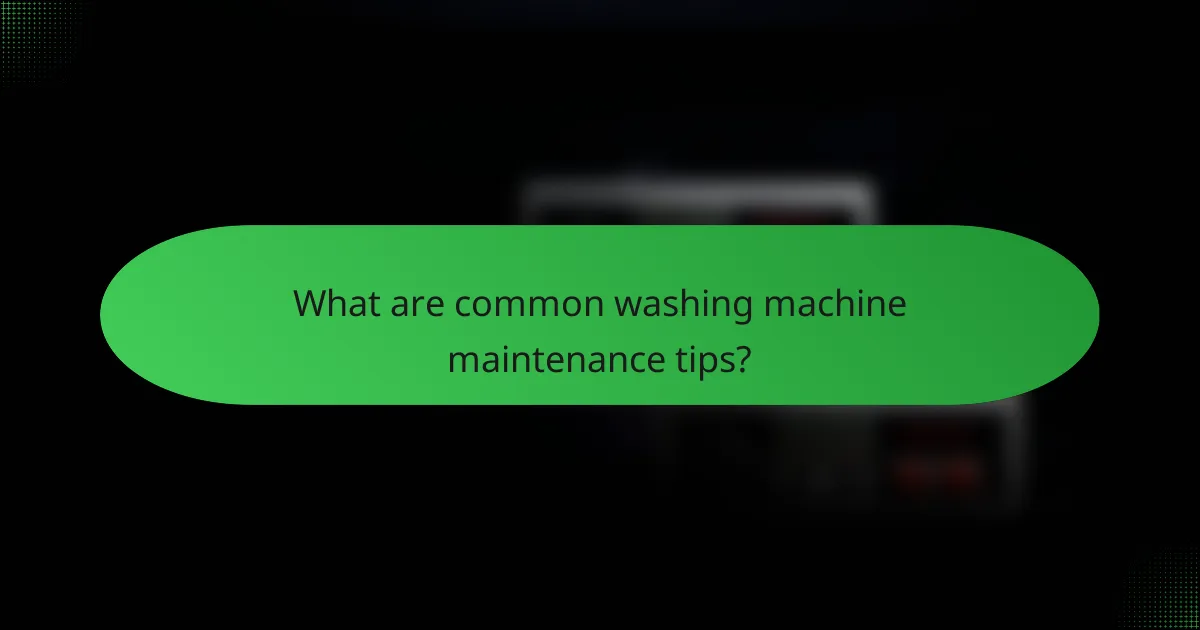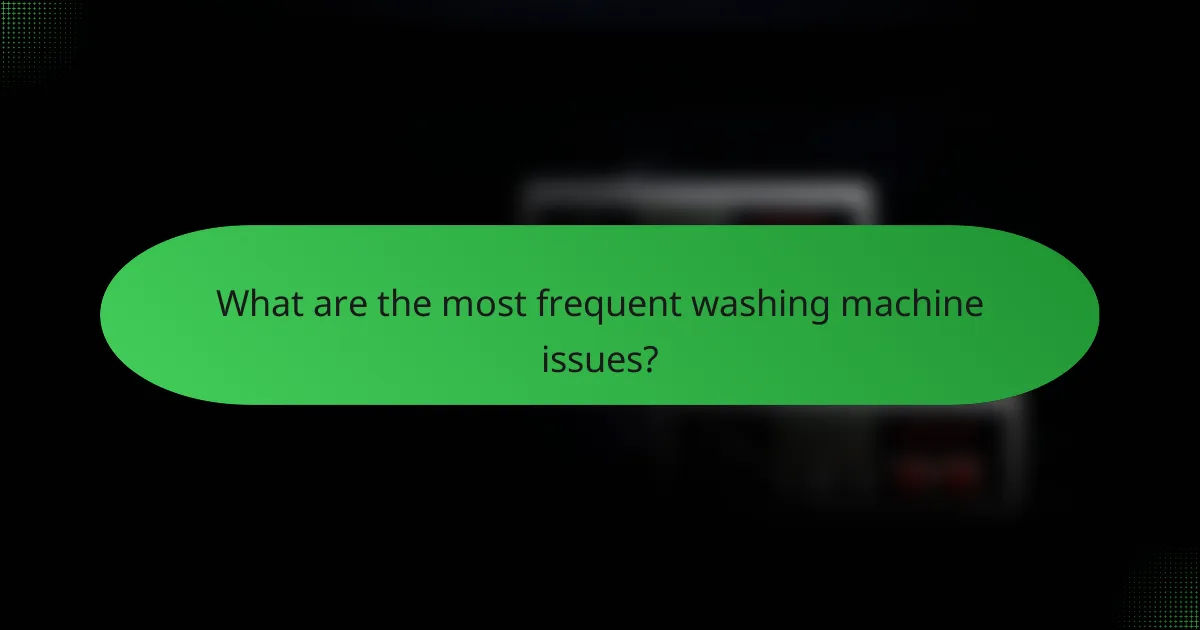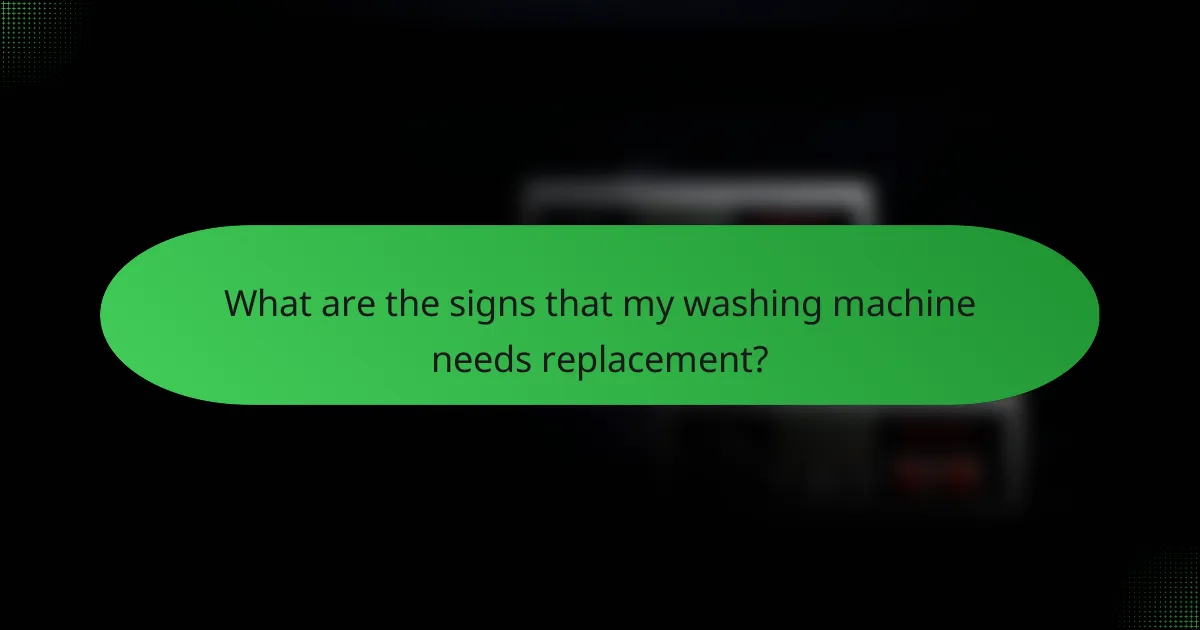Maintaining your washing machine is essential for ensuring its longevity and optimal performance. Regular practices such as cleaning the drum, checking filters, and inspecting hoses can prevent common issues like water drainage problems and excessive vibrations. By understanding these potential challenges and knowing how to troubleshoot them, you can save time and avoid costly repairs.

What are common washing machine maintenance tips?
Regular maintenance of your washing machine can extend its lifespan and improve performance. Key practices include cleaning the drum, checking filters, inspecting hoses, leveling the machine, and using the correct detergent.
Regular cleaning of the drum
Cleaning the drum of your washing machine helps prevent odors and buildup of detergent residue. Aim to clean the drum every month by running a hot cycle with vinegar or a drum cleaner.
After each wash, leave the door open for a while to allow moisture to escape, which helps reduce mold growth. Wipe down the drum and door seal regularly to maintain cleanliness.
Checking and cleaning filters
Filters in washing machines trap lint and debris, so checking and cleaning them is essential for optimal performance. Depending on usage, inspect the filters every few months and clean them to prevent clogs.
Refer to your machine’s manual for specific instructions on how to access and clean the filters. A clogged filter can lead to drainage issues and longer wash cycles.
Inspecting hoses for wear
Regularly inspecting the hoses connected to your washing machine can prevent leaks and water damage. Look for signs of wear, such as cracks or bulges, and replace hoses that show any deterioration.
It’s advisable to replace hoses every five years, even if they appear to be in good condition. Use high-quality hoses that meet local plumbing standards for added safety.
Leveling the machine
Ensuring your washing machine is level is crucial for efficient operation and to prevent excessive vibrations. Use a level tool to check the machine’s alignment, adjusting the feet as necessary.
A properly leveled machine reduces noise and wear on components, leading to a longer lifespan. If you notice excessive shaking during cycles, recheck the leveling immediately.
Using the right detergent
Using the appropriate detergent for your washing machine type is vital for effective cleaning and machine health. High-efficiency (HE) machines require HE detergent, which produces fewer suds and is designed for lower water usage.
Always follow the manufacturer’s recommendations for detergent amounts and types. Using too much detergent can lead to residue buildup and may require additional cleaning cycles to resolve.

What are the most frequent washing machine issues?
The most common washing machine issues include water not draining, excessive vibrations, door sealing problems, and unusual noises during operation. Understanding these issues can help you troubleshoot effectively and maintain your appliance.
Water not draining
If your washing machine isn’t draining, it may be due to a clogged drain hose or a malfunctioning pump. Check the drain hose for kinks or blockages, and ensure it is properly positioned at the correct height to allow for drainage.
Additionally, inspect the pump filter for debris. Regular maintenance, such as cleaning the filter every few months, can prevent drainage issues and prolong the life of your machine.
Excessive vibrations
Excessive vibrations during a wash cycle can indicate an unbalanced load or improper leveling of the machine. Ensure that the washing machine is on a flat, stable surface and adjust the feet if necessary to level it.
When loading the machine, distribute clothes evenly to avoid unbalanced loads. If vibrations persist, consider checking for worn-out shock absorbers or suspension springs, which may need replacement.
Door not sealing properly
A door that does not seal properly can lead to leaks and inefficient washing. Inspect the door gasket for any signs of wear, tears, or debris that may prevent a tight seal. Cleaning the gasket regularly can help maintain its integrity.
If the door latch is malfunctioning, it may need adjustment or replacement. Always ensure the door is fully closed before starting a cycle to avoid interruptions and leaks.
Unusual noises during operation
Unusual noises, such as grinding or banging, can indicate foreign objects trapped in the drum or issues with internal components. Check pockets before washing to avoid items like coins or keys that can cause damage.
If noises persist, it may be a sign of worn bearings or a malfunctioning motor. In such cases, consulting a professional technician for diagnosis and repair is advisable to prevent further damage.

How can I troubleshoot washing machine problems?
Troubleshooting washing machine problems involves identifying the symptoms and systematically checking components. Common issues can often be resolved with simple steps, saving time and repair costs.
Steps for diagnosing water drainage issues
To diagnose water drainage issues, start by checking the drain hose for kinks or clogs. Ensure the hose is not more than 91 cm (36 inches) above the ground to maintain proper drainage.
If the hose appears clear, inspect the pump filter for debris, which can obstruct water flow. Regular cleaning of the filter can prevent future drainage problems.
How to fix excessive vibrations
Excessive vibrations during a wash cycle can often be attributed to an unbalanced load. Distributing clothes evenly in the drum can minimize this issue.
If unbalanced loads are not the problem, check the leveling feet of the washing machine. Adjust them to ensure the machine is stable and sitting flat on the floor.
Resolving door seal problems
Door seal problems can lead to leaks and should be addressed promptly. Inspect the rubber gasket for tears or debris that may prevent a proper seal.
Cleaning the door seal with a mild detergent can help remove buildup. If damage is evident, replacing the seal may be necessary to prevent leaks during operation.
Identifying and fixing unusual noises
Unusual noises from a washing machine can indicate various issues. Start by checking for loose items, such as coins or buttons, that may be trapped in the drum or pump.
If the noise persists, inspect the drive belt and motor coupler for wear. Replacing these components can often resolve mechanical noises and restore normal operation.

What are the best practices for washing machine care in the UK?
To ensure optimal performance and longevity of your washing machine in the UK, regular maintenance and proper usage are essential. This includes routine cleaning, using the right detergents, and addressing any issues promptly.
Seasonal maintenance tips
Seasonal maintenance helps prevent common washing machine issues. Every few months, check and clean the filter to remove lint and debris, which can cause blockages. Additionally, inspect hoses for wear and tear, replacing them if they show signs of damage.
During colder months, ensure that the machine is not exposed to freezing temperatures, as this can damage internal components. If your washing machine is in an unheated area, consider insulating the pipes or moving it to a warmer location.
Using eco-friendly detergents
Using eco-friendly detergents is beneficial for both your washing machine and the environment. These detergents are typically biodegradable and free from harsh chemicals, reducing the risk of residue buildup in your machine. Look for products that are certified by reputable eco-labels.
When selecting eco-friendly options, consider the dosage based on your load size. Many brands offer concentrated formulas that require less product per wash, which can be more economical in the long run. Always follow the manufacturer’s guidelines for optimal results.

How do I choose the right washing machine for my needs?
Choosing the right washing machine involves considering your laundry habits, space, and budget. Focus on features that align with your lifestyle, such as energy efficiency, load capacity, and available space in your home.
Comparing energy efficiency ratings
Energy efficiency ratings indicate how much electricity a washing machine uses compared to its performance. Look for machines with high ratings, typically labeled A+++ in Europe or ENERGY STAR certified in the U.S., as they can save you money on utility bills over time.
When comparing models, consider the estimated annual energy consumption, which can range from around 150 kWh to over 300 kWh. A more efficient machine may cost more upfront but will often pay for itself through lower energy costs.
Understanding load capacity
Load capacity refers to the maximum weight of laundry a washing machine can handle in one cycle. Machines typically range from about 5 kg to 12 kg, so choose one that fits your household’s laundry volume.
If you frequently wash large items like blankets or have a large family, opt for a higher capacity model. Conversely, if you live alone or have limited space, a smaller capacity machine may suffice. Always check the manufacturer’s specifications to ensure you select the right size for your needs.

What are the signs that my washing machine needs replacement?
Signs that your washing machine may need replacement include persistent leaks, excessive noise during operation, and failure to clean clothes effectively. If repairs become frequent or costly, it might be more economical to invest in a new machine.
Age of the machine
The age of your washing machine is a crucial factor in determining whether it needs replacement. Most machines last around 10 to 15 years, depending on usage and maintenance. If your machine is approaching or exceeding this age range, it may be time to consider a replacement.
Older machines often lack energy efficiency and advanced features found in newer models. Upgrading can lead to lower utility bills and improved cleaning performance, making it a worthwhile investment.
Additionally, if your washing machine requires frequent repairs and is over a decade old, the cost of maintaining it may outweigh the benefits of keeping it. Evaluate repair costs against the price of a new machine to make an informed decision.
